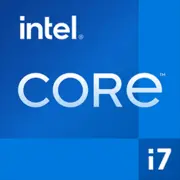Intel Core i7-8705G

Intel Core i7-8705G: Compact Power for Mobile Tasks. Analysis in 2025
Introduction
In 2025, the laptop market continues to evolve, yet some "universal" processors from previous years remain relevant. One such processor is the Intel Core i7-8705G (Kaby Lake G), released in 2018. Despite its age, it remains an appealing choice for users needing a balance between performance and mobility. Let's explore why this chip is still available for purchase and who it's suitable for.
Architecture and Process Technology: Intel and AMD's Hybrid Experiment
The i7-8705G processor is the result of a rare collaboration between Intel and AMD. It houses:
- 4 cores, 8 threads (Hyper-Threading) with a frequency of 3.1–4.1 GHz.
- Integrated Radeon RX Vega M GL graphics (AMD) with 4 GB of HBM2 memory.
- 14 nm process technology for CPU and 14/12 nm for GPU (GloFo).
Architecture Features:
- Discrete GPU Emulation: Vega M GL's performance is comparable to the NVIDIA GeForce MX150, allowing for games like CS:GO or Dota 2 to run on medium settings well into 2025.
- HBM Memory: High bandwidth (up to 179 GB/s) reduces latency in graphics processing.
- Monolithic Design: The CPU and GPU are connected via EMIB (Embedded Multi-Die Interconnect Bridge), which reduces the size of the motherboard in laptops.
TDP and Power Consumption: The Price of Performance
TDP for the i7-8705G is 65W, which is higher than typical mobile processors (e.g., 15–28W for Intel's U-series). This results in two main consequences:
1. Enhanced Cooling System Required: Laptops based on this chip are usually thicker than ultrabooks (e.g., Dell XPS 15 2-in-1 from 2018).
2. Limited Battery Life: Even with a 70–80 Wh battery, runtime rarely exceeds 6–7 hours during office tasks.
Power-Saving Technologies:
- Intel SpeedStep: Dynamic frequency scaling based on load.
- Low Power GPU Mode: When running on battery, the graphics clock frequency is reduced by 20–30%.
Performance: How Does the Chip Hold Up in 2025?
Office and Multimedia
- Geekbench 6: 1106 (Single-Core), 3101 (Multi-Core). For comparison, the budget Acer Swift 3 (2025) with Intel Core i5-1335U shows 1800/6500.
- Real-World Tasks:
- Streaming 4K video (YouTube) — CPU load at 15–20%.
- Photoshop: Processing a 25 MP RAW file takes 8–10 seconds (compared to 5–6 seconds for Apple M2).
- Opening 20 tabs in Chrome — possible brief stutters.
Gaming
- 1080p / Medium Settings:
- The Witcher 3 — 35–40 FPS.
- Cyberpunk 2077 (with FSR 2.0) — 25–30 FPS.
- Valorant — 90–100 FPS.
- Turbo Mode: CPU frequency reaches 4.1 GHz on 1–2 cores for no more than 30 seconds due to overheating.
Multitasking
- Rendering in Blender (BMW Scene): 12 minutes 40 seconds. Modern Ryzen 7 7840U handles it in 6–7 minutes.
Use Cases: Who is the i7-8705G Suitable for in 2025?
1. Students and Freelance Designers: For work in Adobe Illustrator, Lightroom, and light 3D modeling.
2. Budget Gamers: If the budget is $600–800 and one wants to game without a discrete graphics card.
3. 2-in-1 Users: Devices like the HP Spectre x360 15 (2019) with touchscreens and stylus support.
Examples of 2025 laptops with i7-8705G:
- Refurbished Dell Precision 5530 ($650–750): For CAD modeling.
- New Chuwi CoreBook X ($699): A Chinese brand focusing on portability.
Battery Life: The Weak Point of the Hybrid
- Web Surfing: 5–6 hours (brightness 150 cd/m²).
- Video Playback: Up to 4.5 hours (local 1080p file).
- Gaming: 1.5–2 hours.
Tip: Look for models with an 80 Wh battery and fast charging support (50% in 30 minutes).
Comparison with Competitors
1. AMD Ryzen 7 5800U (2021):
- Pros: Better multithreading (8 cores/16 threads), battery life.
- Cons: Vega 8 graphics are 30% weaker.
2. Apple M1 (2020):
- Pros: 18 hours of usage, instant responsiveness.
- Cons: Limited compatibility with Windows applications.
3. Intel Core i5-1240P (2022):
- Pros: More modern architecture, supports PCIe 4.0.
- Cons: Iris Xe graphics trail behind Vega M GL.
Pros and Cons
Strengths:
- Unique graphics for integrated solutions.
- Support for Thunderbolt 3.
- Affordable price in the refurbished segment.
Weaknesses:
- High heat output.
- No support for Wi-Fi 6 or DDR5.
- Limited upgradeability: memory and SSD are often soldered.
Recommendations for Choosing a Laptop
1. Device Type:
- Ultrabook: Not suitable due to TDP.
- 2-in-1 Hybrid: Only models with active cooling.
- Compact Workstation: Optimal choice (e.g., Dell Precision).
2. What to Look For:
- Cooling: Minimum of two fans.
- Ports: Thunderbolt 3 is essential for external GPU connection.
- Screen: 100% sRGB for design tasks.
Final Conclusion
The Intel Core i7-8705G in 2025 is a choice for those who:
- Seek an affordable laptop ($600–800) with "gaming" potential.
- Value versatility (work + entertainment).
- Are willing to tolerate 5–6 hours of battery life.
Key Advantages: Powerful graphics without a discrete GPU, compatibility with Windows 10/11, and basic VR support.
Alternative for 2025: If the budget allows for $900–1000, it’s better to choose a laptop with the Ryzen 7 7840HS and Radeon 780M — offering higher performance and battery life.
Basic
CPU Specifications
Memory Specifications
Miscellaneous
Benchmarks
Compared to Other CPU
Share in social media
Or Link To Us
<a href="https://cputronic.com/cpu/intel-core-i7-8705g" target="_blank">Intel Core i7-8705G</a>